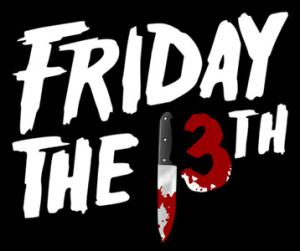THE NUMBER 13
 The belief that the number 13 is unlucky is so widespread that its origins are unclear — different theories link it to Christian tradition (specifically related to the Last Supper, where Judas is said to have sat at the thirteenth place at the table); Viking lore (the trickster god Loki being the 13th god); and the Persian zodiac (in which there are 12 signs, leaving the number 13 to represent chaos.) The specific fear of Friday the 13th dates back to the 19th century, combining two old superstitions: the fear of the number 13 with the belief that Fridays are unlucky days.The morbid fear of the number 13 is technically known as “triskaidekaphobia”, and is so common that many buildings have no floor 13 — going straight from 12 to 14.
The belief that the number 13 is unlucky is so widespread that its origins are unclear — different theories link it to Christian tradition (specifically related to the Last Supper, where Judas is said to have sat at the thirteenth place at the table); Viking lore (the trickster god Loki being the 13th god); and the Persian zodiac (in which there are 12 signs, leaving the number 13 to represent chaos.) The specific fear of Friday the 13th dates back to the 19th century, combining two old superstitions: the fear of the number 13 with the belief that Fridays are unlucky days.The morbid fear of the number 13 is technically known as “triskaidekaphobia”, and is so common that many buildings have no floor 13 — going straight from 12 to 14.
BLACK CATS
Black cats have long been seen in Western cultures as an omen of bad luck — they have long been associated with witches, and many cultures believe that a black cat crossing your path means you will suffer disaster or even death. Gamblers are especially fearful of the black cat curse — many of them believe that if they see a black cat while going to a casino, they should abandon their plans to gamble there. However, it’s not all bad news for the black cats; in some cultures, including in Japan, Great Britain and Ireland, the opposite is true, and black cats are seen as bringers of good luck.
THE SCOTTISH PLAY
Actors can be a superstitious group — and nowhere is that more apparent than around Shakespeare’s play Macbeth. The superstition holds that saying “Macbeth” in a theatre (outside of actually performing the play itself) will bring misfortune on the production — instead, actors will simply call it “The Scottish Play”. Productions of Macbeth are said to have been magnets for disaster from its very first performance — when legend has it the lead actor was killed when a real dagger was used instead of a stage prop.
The other best-known actorly superstition is that wishing someone “good luck” before they go on stage will actually bring them the opposite — so instead actors tell each other to “break a leg”, on the grounds that wishing them bad fortune will presumably also bring about the opposite. The exact origins of this superstition are unclear, but it’s thought to have originated in the 1920s.
GARGOYLES
Having a series of grotesque statues and faces on the outside of your building might not seem like an obvious thing to do, but the frequency of them — from the “Hunky Punks” and rather obscene “Sheela na gigs” of Ireland and the UK to true Gargoyles. To get technical, it’s a form of “apotropaic” magic; something intended to scare away evil. And true gargoyles serve another, much more practical purpose as well — their mouths are spouts that channel rainwater off the roofs of churches.
DEAD MAN’S HAND
The Dead Man’s Hand — a pair of black eights and a pair of black aces, plus a fifth unspecified card — is widely held to be an unlucky hand in poker (even though it’s actually a pretty good hand). Why? Because legend has it that those were the cards held by Wild Bill Hickok, the famous Wild West lawman and gunslinger, when he was shot and killed while playing poker in Deadwood in 1876. There’s little actual evidence that the story’s true — no contemporary accounts say what cards he was holding — but that hasn’t stopped superstitious gamblers believing it. If you ever see a character in a film get dealt this hand, there’s a good chance they’ll meet a sticky end very soon.
CROSSING FINGERS
Crossing your fingers to wish for good luck (or, secretly, to get you out of keeping a promise) is common around the world — but its origins are unclear. It seems to be most common in Christian countries, suggesting that it’s related to the Christian sign of the cross. However, other suggestions include it being an old Pagan or Norse gesture, or possibly a good luck superstition created by archers during the “Hundred Year War” between England and France (archers used their two main fingers to draw back their bow).
BROKEN MIRRORS
It’s a common superstition that a broken mirror will result in seven years bad luck — it’s thought this belief can be traced back to the idea that a mirror captures part of your soul. So when a mirror breaks, part of your soul gets broken too. That’s also why some cultures cover up all mirrors and reflective surfaces in a house where someone has died — so their soul can leave the building without getting trapped in the mirror.
GROUNDHOG DAY
The superstition that a large rodent can predict the weather (if he sees his shadow, there’ll be an early spring; if he doesn’t, there’s six more weeks of winter) might seem ridiculous. But that doesn’t stop it being extremely popular in the U.S. and Canada — even more so since one of the most famous groundhog, Punxsutawney Phil of Pennsylvania, was immortalized in the film of the same name. The tradition of animals’ shadows predicting the coming of actually dates back to an old German superstition around Candlemas Day, which was brought to the Americas by Germanic immigrants. But how good is Punxsutawney Phil’s record as a meteorologist? Pretty bad, actually — according to the Stormfax Weather Almanac, tracing his record for over a century, he’s only been right 39 percent of the time.
SPILLED SALT
It’s an old superstition that accidentally spilling salt is a bad omen: it’s said that it draws its origins from the Christian tradition, due to Judas Iscariot having supposedly spilled salt at the Last Supper shortly before he betrayed Jesus. In fact, its origins are probably much more pragmatic: until recent times, salt was really expensive, so spilling it was already rather unlucky. It was also used as a sign of friendship and hospitality — spilling salt offered to you by your host was a bad sign. Much like black cats, spilled salt can work both ways — another common superstition holds that throwing a pinch of salt over your left shoulder brings good luck and wards off evil.
666
Hexakosioihexekontahexaphobia — that’s the technical name for the fear of the number 666, otherwise known as the Number of the Beast. This superstition undeniably comes from Christianity — the number is mentioned as being representative of Satan in the Biblical Book of Revelations. It’s gained in popularity through being heavily featured in films like The Omen, and was taken so seriously by former U.S. President Ronald Reagan that when he moved into a private house at the end of his presidency, he had the address changed from 666 to 668. However, it might be that everyone’s got it wrong all this time — in 2005, a group of scholars announced that they discovered evidence that the number was originally supposed to be 616, not 666.
WALKING UNDER LADDERS
Walking underneath a ladder is widely held to be bad luck. Despite some theories suggesting that this is to do with the triangle formed by a ladder representing the Christian Holy Trinity, the most likely explanation is far more simple and obvious: walking under laddders is quite dangerous. It’s actually just sensible health and safety advice dressed up as a superstition.
CHAIN LETTERS
Chain letters are an old phenomenon, dating back to at least 1888 — letters that ask the recipient to copy them and pass them on, often warning the superstitious that some terrible fate will await them if they don’t (often giving examples of bad things that have happened to people who didn’t forward them). And the arrival of email and then social networks — making it even easier to pass messages along — has only increased the popularity of chain mail. While many chain letters are money-making scams, the reasons behind the more superstitious ones are unclear, beyond a simple desire to see how far something will spread.
THE BLACK WITCH
The Black Witch moth (Ascalapha odorata) is seen as an omen of death and misfortune in superstitions across the Caribbean, Central and South America. In Mexico, it’s believed that one of the moths flying into the house of someone who is sick means that their death is close. In Jamaica, where it’s known as the “duppy bat”, it’s thought to be a lost soul and bring bad luck with it. While this moth gets singled out for superstition, it’s not alone — moths of all kinds have long been associated with death in Central American cultures. The Black Witch was featured in a gruesome manner in the novel The Silence of the Lambs — but was replaced with the Death’s Head moth in the film version, presumably because that moth looks scarier.
 The apprehension surrounding Friday the 13th may have biblical origins, as Christ’s crucifixion is believed to have taken place on a Friday. Thirteen was also the number of guests present at the Last Supper, and the apostle Judas, who would later betray Jesus with the infamous Kiss of Judas, supposedly was the 13th person seated at the table, according to the New Testament.
The apprehension surrounding Friday the 13th may have biblical origins, as Christ’s crucifixion is believed to have taken place on a Friday. Thirteen was also the number of guests present at the Last Supper, and the apostle Judas, who would later betray Jesus with the infamous Kiss of Judas, supposedly was the 13th person seated at the table, according to the New Testament.